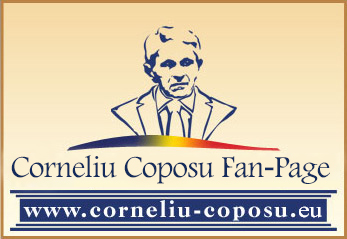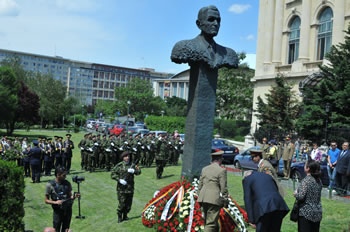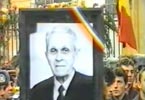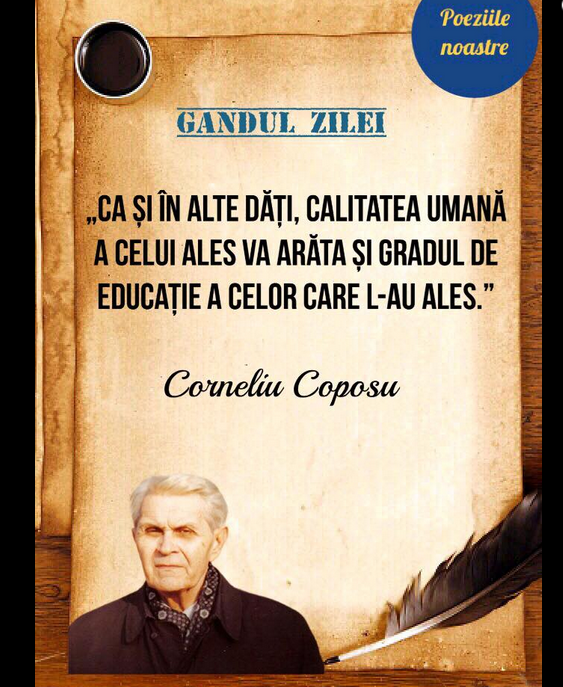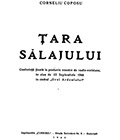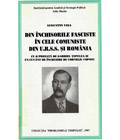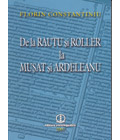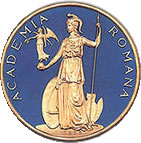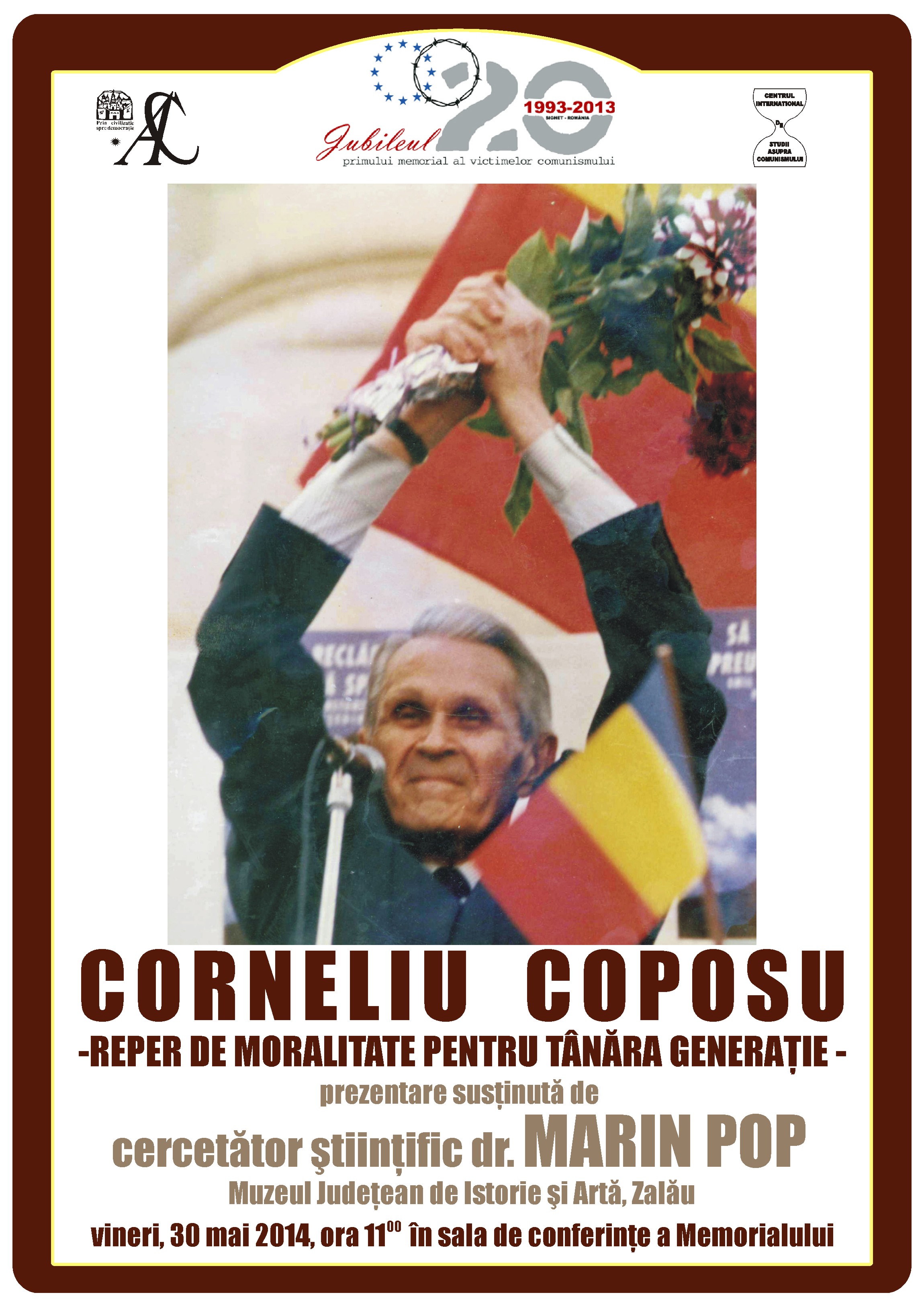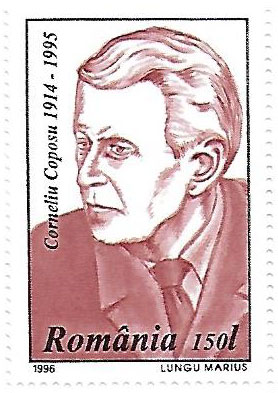(RO: Corneliu Coposu, monarhist până la moarte)
Corneliu Coposu, monarchist untill death
This is not a figure of speech. Our senior has been all his life a great monarchist and kept this belief until the end…
Mr Coposu has always shown his royalist attachment strongly pointing out the belief that the monarchy would give back to Romania its national identity and its’ national condition.
He truly believed in his heart that only monarchy is the truth wich would make us free.
After the Christian revolution from December 1989, Coposuhas achieved his dream and met its Majesty to whom he had the honor to be not only devoted and dutiful, but also a political adviser and a good friend. King Mihai sometimes said that meetings with Mr. Coposu from Versoix represented wonderful moments. He was the man, the king always reposed confidence.
King Mihai and Corneliu Coposu represented and still represent our national models, national guides, great personalities, bold and serene.
In a chaotic and excited world, in sorrowful and opportunist times, the two personalities remained righteous. The two twin spirits preserved their strong belief in God and in Romania’s faith. We never knew and we still haven’t learned how to follow their example.
The attachment towards king Mihai and the belief that the constitutional monarchy represents the solution for our country were a very important component in the senior’s moral and political testament. Whoever forgets these things, is not worthy of having the honor to have met him and to have benefited from his confidence.
April 1992, the light of joy
While, Easter Holidays in 1992, when His Majesty the king returned to Bucharest after long decades of exile, Mr. Coposu semed very happy and he was so very rarely in his life,according to his sisters,ladiesFlaviaBalescu and Radica Coposu. The joy was simply shining upon his face. He was staying behind the king in the church Sfantul Gheorghe, and he was confirming himself his ideal of belief‘in the good intuition of theRomanian people,’ which he never stopped having in the darkest periods of his life, as his sisters told us.
I met him again at Intercontinental hotel in a late evening, where he came, in order to have the last meeting with his majesty. The king had been receiving by then hundreds of Romanian people, who came there to meet their vivid history. Tall and calm, Mr. Coposu was passing slowly through the young people to get near the sovereign. I then took part to the most wonderful and undeserved honor of my life to be presented by the senior of the Romanian politics to King Mihai with the simple words:‘Your Majesty, here are some young people who only want to kneel in front of your majesty… The king laughed with real understanding and also with an adolescentexpression of surprise that made us sink into the earth and we were crowded and nailed in the step of the door. Mr. Coposu made us sign to get closer to king,in the same way in which in our childhood, our beloved, sitting beside the Christmas tree were usually making us sign, to come quick, not to lose the arrival of Santa Clause (but Santa Clause was always disappearing before our arrival).I do not remember how I arrived in front of the senior. I have knelt and this was the most reverential moment of my life. The reverence in front ofKing Mihai! King of my adolescence dreams, the king of my questions about a hidden and stolen history, My King!
I felt spontaneously that I was capable to lay down my life for his majesty. Mr. Coposu had made us the extraordinary surprise to introduce us to his majesty. I was accompanied by some ‘tramps’and Mr. Coposu took my hand and introduced me to queen Ana. Everything seemed so familiar to me…
‘Your majesty, do not leave, this is your country!But both Coposu and King Mihai were convinced that they could not go back upon their words, and the promise of leaving the country must not have been forgotten. The usurpers have always had benefits due to this noble honor. The miracle lasted only 3 days.
I have never had such a feeling of hopeless frustration as in the day, I accompanied the royal family at the airport.
The little Prince Nicolae was crying and the confused people were looking for Mr. Coposu, their hope, their certitude.
The Sovereign’s defender
Mr Coposu has strongly and permanently defended King Mihai, against Iliescu’s regime, and also against the offences of some members in the opposing parties. I do not remember to have seen Coposu more furious than in the moment when PNL’s President Radu Campeanu proposed the presidential candidature of King Mihai. He went rapidly to Versoix and so King Mihai found again his friend and the adviser he needed. It is sure that King Mihai has neverthought to accept the stupid proposal, and after the frenzy of the cheerful Mr. Coposu, they have amused together, although the situation was not to bea humorous one, but however, some times the humor is the tear of the apostles.
Mr. Coposu treated the last president with a great humor. The anger was always from the part of Cotroceni. He always passed beyond his defamations and his offences, even with our advisers of the civil society, fried from shell,Coposu was threatening him with the justice. Although Iliescu did not have an honorable behavior, neither concerning the fact that opposing leader has not militated for the adjustment of the clause nor concerning the great aberration that the Peasant Party, was at the revolution at the Russian embassy. However, Mr. Coposu has not considered the scandalas a solution for this case. The fact which made Coposu to end all the negotiations with Cotroceni and to break all the diplomatic relations was the incredible lie telling that Coposu has said to Iliescu, he considered that the presence of King Mihai at Alba Iulia on first December was inopportune. Since then, Coposu never came to Cotroceni ending all the diplomatic relations with Mr. Iliescu. The presidential affirmation which suggested the infidelity of the senior concerning the king, was for Mr. Coposu the greatest and the worst offence.
He was always angry because of the political carelessness of some members from the liberal party, which gave to his majesty some certitudes, without offering security and political support, concerning the possibility of the King to come into Romania. The king has then tried to visit his country, but he was forced to comeb back from the Otopeni Airport inOctober 1994. The seniorwas not in the country back then, he was in Wilcherberg, because of medical issues. He told me that he was very grieved because of the terrible event in which the King was involved. Beside the political inability of the members from the opposing country, Mr. Coposu was deeply affected of King’s Mihai suffering, for having been driven again from his own country. He loved King Mihai as sovereign but in the same time, he loved him as a great human being he had the chance to meet.
Mister NO
This was the way princess Maria called Mr. Coposu, Mister No, ‘Monsieur non’, because he was always against all the prodigies which came before his Majesty. The prodigies were not only a few. One of them was the fact concerning the presidency of the republic, but there were also other things.The beautiful princess was amusing herself because of the tipical transilvanian obstinacy with which Mr. Coposu was expressing his logic. At the senior’s burial, his Royal Highnesswas crying.
The dream from Paris
In May 1944, thanks to our regretted Aureliu Rauta, a romanian man established in Spain, who has sponsored the people of our country in their trip to Paris as well as the Parisian reunion, a meeting of the exiled people. At its end, their majesties, King Mihai and Queen Ana have come together with Princess Margareta, as guests of honor to the reception of the Romanian people from everywhere. Those days specific to a real dream were adumbrated by the fact that the healthy state of Mr. Coposu rapidly changed. At home, he caught a cold, which he treated superficially. In Paris, after a week, he had a degrees fever, and he could not come out of the bed. The lost nights without sleeping, had a bad influence on his health. Mr. Emil Constantinescu was blaming our irresponsibility with which we were exploiting Mr. Coposu, who meanwhile, was telling us jokes and laughing of our laughter. Even when he caught the pneumonia, he did not lose his humor. He considered himself as being very spoiled thanks to the intensive care he was treated by Rodica Coposu and Galatea Cioranescu. He was very sick when the Royal family came to Paris. However, he participated to the private meetings with his majesty and also to the Romanian reunion, even if in his situation, one would have not left the hospital. His loyalty towards the king was above his suffering. Although anybody, besides doctor Baican, knew about his bad health state, Mr. Coposu realized that it might be his last chance to see the king. Then, the medical operation and the medical treatment in Germany followed. As much as he was able to speak, he was always keeping contact on the telephone with His Majesty.
‘We will get the election, and we will get to restore the monarchy’
Returned from Paris, before leaving for his surgery in Germany, Mr. Coposu made the shocking announcement to the press and expressed his convictions. The shocking part consisted in the testamentary force of his statement: ‘We will get the election, and we will get to restore the monarchy. Mr. Emil Constantinescu will become the president and he will bring back our King Mihai on the Romanian throne.’ As an answer for the journalists question concerning the way to restore the monarchy, the senior simply said: ‘We will modify the constitution’. Being asked whether he does not believe that his declaration would bring some elective prejudices to democratic convention and to his presidential candidate, he answered that we can not lie the population and that the Romanian people should know the truth; only in this way, we can change the mentality, and by changing the mentality we can change the society. Even if for the moment, the truth brings us a considerable elective loss, we cannot make compromises with our principles, for some percents achieved through lie. Only the truth can educate the electorate and rise the civic awareness.
Idealism and pragmatism
In all years of struggle for democracy and the rule of law, Mr. Coposu has always militated for the monarchy. The national peasant’s party was following him with great faithfulness. They were making a title of glory thanks to them. The senior was often asked many questions regarding the royal option. Mr. Coposu was always answering that he stresses the importance of the institution of the choice, and this choice was deduced from the sentimentalist approach, putting into light the pragmatic aspect, the monarch is above all the parties and the monarch is not the prisoner of some parties interests, as it is the president of the republic, and that is why such a president can not be impartial as a constitutional king. Then, the senior was underlining the importance of monarchy for the image of the country and for the credibility in front of the external investors, without which he considers that economy cannot become functional and prosperous in the western system. Beyond the affective reasons, the leader of the opposition was speaking about the great personality of King Mihai and about the prestige of his majesty both on the external plan for investments and also on the inner plan for the national reconciliation, and he might give internal stability and social peace as well as political balance. Very often, Mr. Coposu mentioned, referring to the undecided republican people orto those who are concerned with the succession issue, that: I would make a contract with his majesty to straighten the country and then, we can decide the form of the legal state.
The testamentary and legal program
We continue by presenting some revealing declarations concerning the pragmatic conception inherited by the Democratic Christian Peasant National Party, by the Democratic Convention and by the presidential candidate.
‘Our party supports the independence, the integrity and the sovereignty of Romania and struggles for the expansion of Romania up to its ethnic frontiers. We consider Basarabia and Bucovina as being part of the Romanian area. We also consider all the legislation from the communist period as being inexistent, and we engage ourselves in replacing it with legal measures in conformity with the desires and the necessities of the Romanian people. We consider null and void the abdication of his majesty King Mihai the first.
We ask for an integral restitution of all the material and spiritual rights, that were confiscated from Romanian people in the communist regime. We are the supporters of the private property, and we consider that without the private property, a complete liberty cannot exist. We are the supporters of the assurance of the fundamental human rights, of the collective and spiritual liberties, of the legal equality of all the people regardless of their ethnic origin, religious belief or social status. We are a party of the social harmony and we want to unite all the citizens of this country in order to have a contribution in the overcoming of the catastrophic process which Romania stuck nowadays in order to enter in the Europe of tomorrow with the chin up and with dignity. ‘(published in Romania Libera in 25 June 1991, supported in 23 June at the Conference of the Workers’ Organization of PNTCD Bucharest, National Theatre).
‘From the point of view of our constitutional background, we consider that the abdication of His Majesty King Mihai on 30 December 1944 was the result of some Russian military pressure, and so we consider this abdication null and void.’ (13 may 1991 the Meeting of PNCD Organization in the second sector /R.L 15 may 1991).
‘I consider that the essential element which assures credibility outside, trust inside and un absolute warranty for the national reconciliation would be given by His Majesty the King, around whom there could appear the new forms of organization of the City and the perspectives of a new integration in the European civilization’.
-’Monarchy is the only saving solution for the country to overcome the actual critical period’. (30 may, 1994) the press conference of PNTCD).
‘I believe that the members of the government of the (N.N) are afraid of the restoring process of the monarchy, of the resettlement of the democratic institutions, and at the same time, they are afraid of the independent journals.’ (21-22 Nov. 1994, interview in R.1)
‘I have the belief- and with this belief will pass beyond this world-that Romania will direct its steps towards democracy only through monarchy. We have the holy duty to bring back our devoted King on the throne of Romania’.
(4 may, 1995, at the UNITER center, the launching of Marilena Rotaru’s cassette ‘God, save Your people’)
At anniversary with the Great Voivode
To the epaulets of the successor Principe would be attributed, today, the feature of maturity.
The Great Alba-IuliaVoivode has got during his life as a Romanian soldier, the degree of junior. The festival from Sinaia collects in a solitary bunch of souls, all the Romanian consciousness. Our king, of today and of tomorrow steps in life as a Prince from ancient fairytales. King Mihai has grown up proud as a fir tree under the loving eyes of the Romanian people. The fate of the cloudy days took him from his toys and put into his childlike hand the scepter of our destiny. A little angel with golden curls has suddenly appeared on the throne of the glorious grandfather who is beyond this world now.
Then, more than ever the suave melody of the promise was full of inspiration <<I take an oath of loyalty to King Mihai!>>
The toys of the kinglike child, sprinkled with the dust of nostalgia, were waiting for their master, but all in vain!
And then, the relentless fate took pity due to the longing of the melancholy child, due to our prayers and opened the gates of joy.
His majesty was wandering again, serene, on the street of childhood.
Many years have passed, and we have seen a Prince who has understood the mystery of letters, side by side with the ploughman’s son. Then the Successor has learned to know his country, the law and the people, so as to be worthy of the shrines we have raised for him in the depth of our hearts.
He has grown suddenly with the joy and with the hopes of a people.
His holidays were our holydays. His pains were our pains.
We have sent him, proud of Romanians, on the way of the foreign countries and we have signed on the notched of his youth the honor he has made us as a princely messenger of our arias. We have trembled for his life when-while being taken care of by a noble Mother who was sitting at the head of his bed-he was in great pain. Beside his caring Augusta he sat, then, for weeks, watching over a whole country- with her wonderful, full of loyalty uneasiness.
The successor who became the master of our love, becomes now part of the Romanian officers educated in the spirit of duty, nobility, dignity and sacrifice. The Romanian army is enriched with an officer who will cultivate the tradition of the true military spirit. Because under his new tunic will beat and will continue to beat a Romanian heart. The heart of the youngest junior lieutenant...
On the epaulets of the Prince will flourish one by one the glittering of all the military hierarchies. And each feature will bring a beam of sunlight in the dark desert of our uneasiness.
The great Voivode of Alba-Iulia embodies our only hope in a better and in a more brilliant future. He should be at the level of expectation of this people. Because he is predestined, through his name, a glorious name, that embodies the symbolic hope of the early Voivodes.
Today, we too, along with all the Romanian people from the frontiers of the unified country, detach ourselves from the eddy of the dark worries and we go to the feast with the Voivode of our hopes. (4 October, 1937 in ‘The New Romania’).
A word of greeting addressed to Romanian students with the occasion of the manifestation on 10 may
‘The day of 10 may, a holy day for our people, is deeply connected in the Romanians’ consciousness to the proclamation act, in 18877, of the state’s Independence from the Ottoman Empire, from the consolidation of the Romanian Kingdom and from the crowning of the King Carol the First in 1881. Almost as a sign of God’s will, 10 may is associated with the day in which our loyal king Carol the First stepped for the first time in 1966 on the ground of the country he would govern, with an undisguised patriotism towards the improvement of the future free Kingdom of Romania.
By 1947, under the sign of 10 may, Romania had met a flourishing period, of civilization and of progress, that had brought to our country the famous name of a modern, strong and free nat.
The forced setting up of communism, imposed by the Russian army represented along with the deepening of the country in the darkest night of its’ history, the removal from the glorious patrimony of Romanian people, of the day of 10 may, the National Day of Romania.
Without being afraid of the persecution which had already started in 1945, against this historical murder, the whole population of Romania rose, and its’ spear’s point, the young people, initiated and lead manifestations of attachment towards the country and towards the Crown, that culminated with the impressive demonstration from 10 may 1947.
In the Victoria Market, under the frightened and furious eyes of the country treacherous government installed by the Russian people, the students knelt in front of the tribune in which King Mihai was staying and interpreted the patriotic song of 10 may, whose last stanzas modified in that very moment, expressed beside the stated attachment for the king, the decision to fight, despite of the reprisals, for the freedom of the country. Many, too many of the young people from those times sacrificed their life and their freedom for the dignity and for the independence of Romania. Their fiery patriotism was not able to prevent the course of the history imposed by the Soviet Empire and authorized by the egocentric and diplomatic combination and by the lack of interest of the Western countries.
Along with the abdication imposed on King Mihai and the strong setting of the terror of communism, the day of 10 may, became for the Romanian people, every year, an opportunity to suffer intimately for loss of the national, the dignity which Romania did not manage unfortunately to win, not even through the generous sacrifice of the young people in the Revolution from 1989.
But this year, due to the official invitation addressed to King Mihai, (the only state leader from during the Second World War, who is now alive, who has brought his contribution to the victory of the Allies), the Western countries have in fact recognized the contribution brought by the Royal Crown and by the Romanian people to the renaissance of Europe. We can say thus, in this holly 10 may, that the struggle for the regaining of our national dignity receives a new sign of patriotic legitimacy.
I express my greetings for the initiative of the students’ youth to take from the students of the year 1947 (today old and tortured by the sufferings of the prisons), the banner of this fight.’(the Palace Market, Bucharest, 1995).
Leaves in the wind…
At the end of October, there are exactly 3 years since then-Mr. Coposu was spending his last night at home. Not in his little cell where he was usually sleeping but in his sisters’ room. He was feeling very bad and he was talking to his elder sister Mrs. Flavia Balescu (Uchi). He told her then: ‘I am sorry that I’m leaving you alone, and that I will not be able to see the King back on his throne’...
The second day, he was urgently transported to the hospital, where he had to stay 2 weeks crucified on the bed of his last immense suffering.
He was sedated to resist the painful treatment, and he was waking up from time to time. In the wide awake moments, he was communicating through his eyes with his family. In one of those moments, his sisters told him that His Majesty the King had sent him a letter in which he wished him to get better. His eyes moistened and a tear appeared on his cheek.
The Iliescu regime refused the presence of the King at the funeral. Even the last desire of the senior had been totally ignored.
Longing for our senior
I believe that there are not more suitable words about Corneliu Coposu than those words which had been told at his earthly death by Emil Constantinescu, the present president of the country, at that moment, President of CDR.
‘Because the politics does not have priests, it should have existed a great personality named Corneliu Coposu capable to take responsibility for its’ mistakes’.
Certainly, only a feeling of grace could have lead to the formulation of this incomparable sentence. Only a deep pain, a feeling of despair of the hope of a decided disciple, at that moment, made him not to betray his mentor. What has become of the Promise declared solemnly in the name of the Democratic Convention at the funeral of the Senior?
As Corneliu Coposu had discovered and educated him, Emil Constantinescu could have been a great personality for our history. But he started to lose this chance of grace in the moment in which there were just 2 years from the death of the Senior-he declared publicly through a news of the media office of the Presidency, that Mr. Coposuhadnever conditioned the presidential candidature to the bring back King Mihai on the throne of Romania (which was true, as it was involved an unconditioned commitment). But if: debates on this subject have never taken place between the two personalities’-this is an excess of zeal which is similar to the confession of the suicidal apostle…
There are words which you are responsible for, beyond the ephemeral world. And if you defy them, not even a priest of the politics like Corneliu Coposu can take responsibility for your sins. Even if he is able to forgive you, history doesn’t forgive.
A tragedy…
In November 1996, the president of the popular European party, Mr. Vilfried Martens said: ‘it has been a tragedy both for Romania and for European civilization the fact that Corneliu Coposu did not have the chance to be the leader of the country.’ What could we add here?
